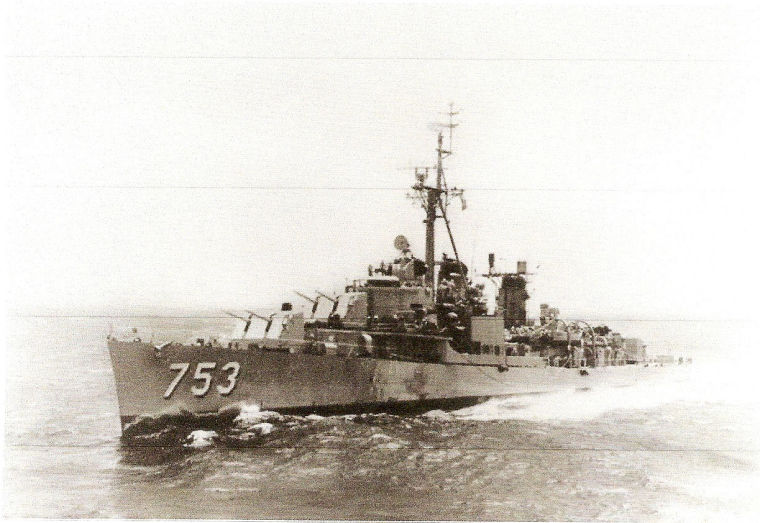As Lt. Thomas Moore signed for documents stamped “top secret” in bold red type, his compact car was being filled with shotguns and explosives.
It was Oct. 22, 1962, and fate had thrust the young naval officer to the forefront of a global crisis that was escalating by the minute. President John F. Kennedy still was hours away from telling the world that the Soviet Union was building nuclear missile sites in Cuba, and the U.S. wouldn’t stand for it.
The president ordered a naval quarantine for what became a 500-mile radius around Cuba, effective Oct. 24. He was careful not to use the word “blockade,” because under international law, that would have been an act of war.
Kennedy’s nighttime address alerted the nation to the Cuban Missile Crisis. By the time the president spoke, Moore already had been enveloped for hours in the unfolding drama.
“On the morning of Oct. 22, I got a telephone call at my Virginia Beach home, and was told to report to the ship immediately,” said Moore, a longtime Albemarle County resident who was operations officer aboard the destroyer USS John R. Pierce.
“Before we got under way, I was sent to our flagship to get the operation orders. I drove over in my Austin A40, a ridiculous little compact car. While I was getting the top-secret orders, they were loading grenades, shotguns and ammunition into my car.
“I thought it was hilarious. Here I am carrying explosives in my civilian car down Hampton Boulevard to where our ship was moored. It was illegal as could be.”
Shotguns are the weapons of choice when boarding a ship at sea. Those — and the top-secret orders — revealed that the Pierce had been selected as one of the ships that would enforce the quarantine.
The Pierce left Norfolk on Oct. 22 and reached its area of operations two days later. The vintage World War II vessel was so old and tired that its chief engineer had pushed a wooden pencil though its hull.
Hearts started beating faster on the afternoon of Oct. 25, when the Pierce’s radio operator received a message that the Lebanese merchant freighter Marucla was in the area. The ship, chartered to the Soviets, was suspected of carrying prohibited cargo to Cuba.
Moore sighted what he thought could be the freighter. He said the Pierce initially was ordered to let it proceed, but a short time later, things changed.
“On the evening of Oct. 25, we received a message to intercept the Marucla,” Moore said. “I got in touch with one of our anti-submarine aircraft flying overhead and asked him to take a look at the vessel I thought was the Marucla.
“He illuminated its stern and confirmed it was the ship we were looking for. We reported this, and then came the message that it would be nice if the official boarding ship would be another destroyer, the USS Joseph P. Kennedy.
“Joseph Kennedy was killed during World War II and was the president’s older brother. We were directed to follow the Marucla until first light, and if the Kennedy couldn’t make it by then, we were to go ahead and conduct the boarding.”
The USS Kennedy kept its four boilers roaring and almost ran out of fuel before arriving shortly after daybreak Oct. 26. Using internationally recognized flag signals, it ordered the Marucla to stop and prepare to be boarded.
Navy protocol dictated that the boarding party had to include two officers of a certain rank. To fill this requirement, the Pierce’s executive officer, Dwight G. Osborne, became senior officer of the boarding party.
“The Marucla was less than a half-mile away,” Moore recalled. “It stopped as soon as we asked it to.
“A motorized whale boat was dispatched from the Kennedy and came by to pick up our executive officer. It then went over to the Marucla.”
The party boarded unarmed. “The captain of the Marucla was very cooperative and lowered ladders for them,” Moore said. “He greeted the boarding party and took them in for coffee before the inspection. He gave them the run of the ship.”
The inspection turned up 12 trucks and harmless cargo. The ship was allowed to proceed.
“Right after I got the report of the results of the boarding, I suspected they had purposely chosen a ship which wouldn’t have had missiles on it so as not to escalate the situation,” Moore said.
“In other words, they would board a relatively innocent ship first to show we were serious, but not one with missiles on it. If we had boarded a ship with missiles on it, we would have had to take it into custody and bring it to a port in the United States.
“So they were careful not to ratchet the situation up immediately. If the boarding didn’t have the result they wanted, then they would board the ships with missiles.”
Information declassified a few years ago revealed that the White House had a list of the different Soviet ships headed toward Cuba and their suspected cargo, Moore said. Fortunately, it took only one boarding to get the hoped-for results.
“The Soviets’ reaction to the boarding was very close to immediate,” said Moore, a vendor of homemade pies at Charlottesville’s City Market. “Not too much later we could see on radar that all the inbound Soviet ships were turning around and heading back.”
The crisis ended Oct. 28, 1962, 50 years ago today, when Soviet leader Nikita Khrushchev announced over Radio Moscow that he’d agreed to move the missiles from Cuba. By then, Kennedy had agreed not to invade the tiny country off the tip of Florida. The deal came less than two years after the young president approved the ill-fated “Bay of Pigs” invasion of southern Cuba.
It often has been said since that Khrushchev blinked. Perhaps closer to the truth, both men blinked. That was the picture painted at a recent lecture Moore attended at the University of Virginia, where Khrushchev’s son Sergei, a senior fellow and professor at Brown University’s Watson Institute of International Studies, spoke. He said his father worried that Cuban leader Fidel Castro “was a hothead,” Moore said.
“Khrushchev said his father didn’t want nuclear war, for certain,” Moore said.
“Everybody thinks the U.S. came out on top, but in reality we gave up our missile sites in Turkey. And we promised not to attack Cuba. Khrushchev said his father felt it was an equal exchange.”
Early next month, Moore will host a reunion at his home for eight of his Pierce shipmates.
“We all still have very strong recollections of those days,” Moore said. “Between the Kennedy and the Pierce, we had a great deal to do with ending the crisis.”









